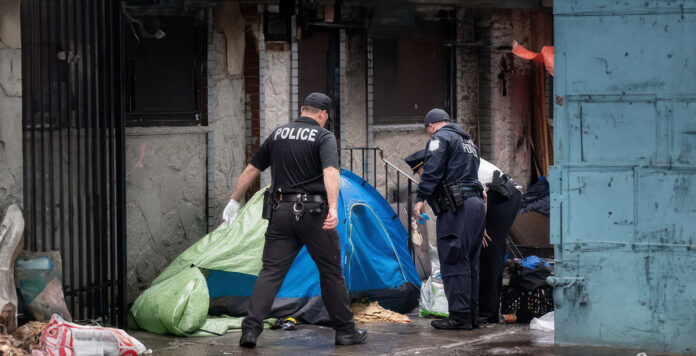
PHILADELPHIA, Pa. – The City of Philadelphia recently addressed public health and safety concerns in Kensington by closing an encampment on the 3000-3100 blocks of Kensington Avenue. This month-long process resulted in 59 individuals accepting housing and services, showcasing a significant step towards tackling the overdose crisis and supporting Kensington’s residents.
The successful closure involved collaboration between city departments, non-profits, and social service staff. Since April 4th, teams from the Office of Homeless Services and the Department of Behavioral Health and Intellectual Disability Services diligently connected individuals to treatment, shelter, and medical care.
Notably, 55 individuals, including three couples, received housing assistance.
“We’re proud of all of the City Departments that worked together to resolve the encampment on two blocks in Kensington that were creating a public safety and health threat to the neighborhood,” Adam Geer, Public Safety director, told the press, following the encampment resolution completion.
“Our outreach teams are Philadelphia’s unsung heroes, and they all put their heart and soul into every engagement,” said Noelle Foizen, Overdose Response Unit (ORU) director.
“Teams work tirelessly to support each person including addressing anything that could be a barrier to placement such as accessibility, mobility, pets, couples, etc., and work hard to find the right resource in challenging situations where at times they are threatened and harassed. They are brave and strong and represent the best of us and Mayor Parker’s vision to connect people to long-term care, treatment, and housing opportunities,” Foizen pointed out.
CONCERNS AND A BROADER VISION
However, the closure wasn’t without criticism. Sarah Laurel, director of Savage Sisters, a Kensington substance abuse non-profit, questioned the displacement timing after outreach efforts. Community member Robert Keepsey echoed this sentiment, emphasizing the need for lasting solutions.
Despite these concerns, Mayor Cherelle Parker’s involvement reflects a broader vision for restoring neighborhoods impacted by drug issues. At a town hall meeting, the Mayor outlined plans for a comprehensive, long-term system of care, treatment, and housing for those struggling with addiction, mental health challenges, and homelessness. The Mayor’s commitment to addressing root causes received community applause and support.
The Kensington encampment closure is part of a larger effort to improve residents’ well-being and restore a safe, healthy environment. Since winter, City outreach teams have engaged with individuals, providing services and resources. Their recent extended outreach program (3 days a week, 4-8 pm) resulted in 32 placements, highlighting the effectiveness of proactive engagement.
WORKING TOGETHER FOR SUSTAINABLE SOLUTIONS
The City’s actions have drawn both praise and criticism, emphasizing the need for ongoing efforts in Kensington and similar communities. Effective, sustainable solutions require dialogue between city officials, community organizations, and residents.
As Kensington evolves, a multi-faceted approach involving outreach, treatment, and community engagement is essential. Mayor Parker’s commitment to long-term solutions, along with the dedication of city workers and outreach teams, demonstrates a collective effort to support vulnerable populations and create a safer, healthier environment for all residents.
The recent Kensington closure serves as a reminder of the ongoing fight against addiction, homelessness, and public health challenges in Philadelphia. By working together and engaging the community, city officials and organizations are taking steps towards a more inclusive and supportive city for all.






